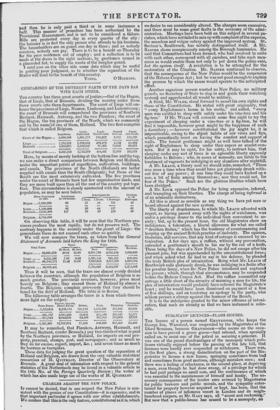CHARGES AGAINST THE NEW POLICE.
IT cannot be denied, that in one respect the New Police is con- sistent with the genius of our Constitution—it is expensive, and in that important particular it agrees with our other establishments. We confess that this is the only feature, constitutional as it is, which we desire to see considerably altered. The charges seem excessive, and there must be some great.faults in the economy of the admi- nistration. Meetings have been held on this subject in several pa- rishes, which have not failed to mix up with complaint of the expense, the senseless and vulgar outcry against the improved system. St. Saviour's, Southwark, has notably distinguished itself. A Mr. BASTER shone conspicifously among the Borough luminaries. He said that Committees had been formed, who had resolved to unite with each other, correspond with all parishes, and take such mea- sures as would enable them not only to put down the police-rate, but the system itself. A revolution is to he attempted for the restoration of the Charlies. Mr. BASTER continued to observe, that the consequence of the New Police would be the suspension of the Habeas Corpus Act ; but he was not good enough to explain the process by which the cause would operate to the anticipated effect.
Another sagacious person wanted no New Police, no military guards, no Secretary of State to step in and guide their watching systemi; and apprehended all would be military. A third, Mr. WILDE, stood forward to assert his own rights and those of the Constitution. He stated with great originality, that " every Englishman's house is his castle," and added, " every man was entitled to sleep with safety under his vine-tree and his fig-tree." If Mr. WILDE will consent some fine night to try the experiment of sleeping under a vine-tree or a fig-tree, he will find it impossible, however great might be the happiness of such a dormitory ; — however constitutional the joy might be, it is impracticable, owing to the abject habits of our vines and figs, which parasitically insist on having the comfort and support of walls. The honest gentleman might as well have talked of the right of Englishmen to sleep under their capers or scarlet-run- ners. But it may be right, for his safety, to instruct him, that sleeping under any sort of trees is an agreeable liberty expressly forbidden to Britons ; who, in cases of necessity, are liable to the treatment of vagrants for indulging in airy slumbers after nightfall. A Mr. LEACH, a thirsty soul we should infer, remarked, "There was once a time when they could have got gloriously drunk with- out fear of any power ; at one time they could have kicked up a row, a bit of frolic among themselves ; now they could not, for fear of the Police." Such are the glorious liberties which have been abridged. A Mr. Loos opposed the Police for being expensive, infernal, and trampling on their liberties. The charge of being infernal is of an admirable distinctness.
All this is about as sensible as any thing we have yet seen or heard uttered against the new system. The liberty of drimkenness, to which Mr. LEACH adverted with regret, as having passed away with the nights of watchmen, was and is a privilege dearer to the individual than convenient to so- ciety; but, up to the present hour, the old Magistrates show an indulgence, a toleration, a liberal allowance for what are called " drunken frolics," which has the tendency of countenancing and keeping up the ancient British practice of inebriety. The opinion, therefore, still survives, that any kind of outrage is excused by in- toxication. A few days ago, a ruffian, without any provocation, extended a gentleman's mouth to his ear by the cut of a knife. These being the days of a New Police, he did not escape after his pleasant joke, but was apprehended by the unconstitutional force; and when asked what he had to say in his defence, he pleaded the truly British plea of intoxication. Being what Mr. LEACH of Southwark calls gloriously drunk, he was indulging in a frolic after his peculiar fancy, when the. New Police interfered and captured his person ; which, through that circumstance, may be suspenddd before the Habeas Corpus Act. Had the ruffian committed any outrage a little short of the atrocity of maiming a man for life, the plea of intoxication would probably have softened the Magistrate's heart ; and he would have been dismissed on payment of a fine of five shillings, and on tendering an apology to the party, who seldom presses a charge against the humour of the Bench. It is to the indulgence granted to the minor offences of intoxi- cation, that such an atrocity as that we have instanced is refer- able.


























 Previous page
Previous page